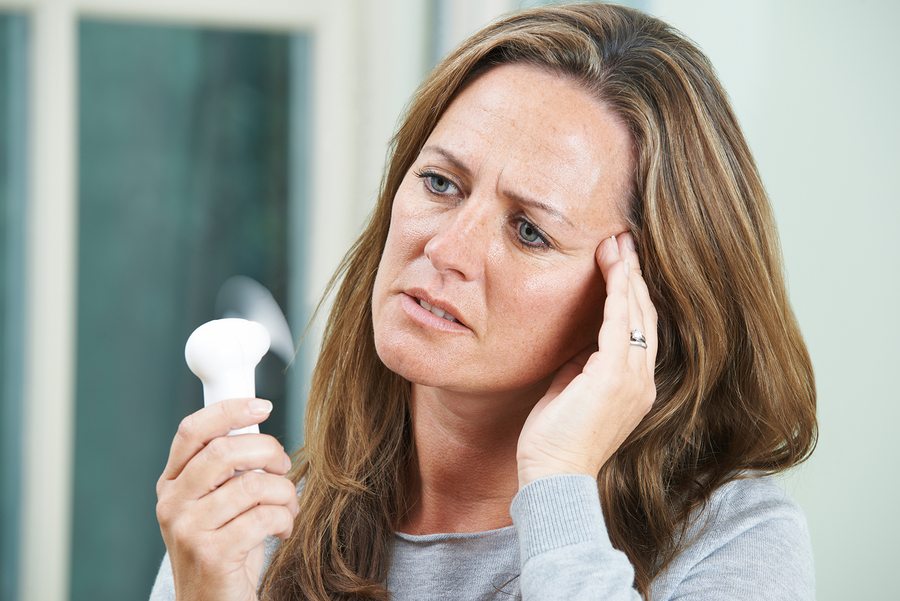Women go through menopause at different ages. Genetics, heredity, certain medical conditions, medications, and surgical removal of the ovaries also play important roles in the onset of menopause.
Symptoms of menopause can range from mild to debilitating, and while some women do not need pharmaceutical treatment, others require synthetic hormones, anti-anxiety medications, or antidepressants.
Hormone replace therapy can help alleviate many of the symptoms of menopause including anxiety, panic, and depression, however, it is not recommended for women with personal or family histories of gynecological cancers, which include ovarian, breast, uterine, and endometrial cancer.
In addition to treating the most common symptoms of menopause, hormone therapy may also help treat the more uncommon effects of menopause including mental health problems. Here are four ways menopause may raise the risk for anxiety and panic attacks, and what can be done about them:
Hot Flashes
The most commonly reported symptoms of menopause are hot flashes and night sweats. These uncomfortable symptoms are the result of fluctuating estrogen levels, and are referred to as vasomotor symptoms.
Not only do hot flashes and night sweats cause profuse sweating, they can also cause electrolyte loss through perspiration, as well as dehydration, and insomnia.
All three of these menopausal symptoms can dramatically increase the risk for anxiety. Sleep helps stave off anxious episodes, however, when night sweats interfere with sleep, anxiety escalates.
To sleep more comfortably while going through menopause, it is recommended that women sleep in cool environments, wear breathable night clothes, keep cool water at the bedside, and avoid caffeine and spicy foods before bedtime.
When dehydration occurs as a result of too much sweating, it can lead to a fast heart rate, weakness, dizziness, and lightheadedness, all of which may contribute to nervousness.
Staying hydrated by drinking plenty of water helps prevent dehydration, however, drinking an electrolyte fortified drink or sports beverage will help replace lost nutrients such as sodium and potassium.
Estrogen Decline
In addition to hot flashes and night sweats, dipping estrogen levels can also lead to shakiness, increased urination, dry eyes, constipation, and depression. Increases in urination may lead to fluid and nutrient loss, which can cause weakness, dizziness, fast pulse, and headache.
To prevent these symptoms from triggering a panic attack, drink plenty of non-caffeinated beverages, and talk to your doctor about taking a vitamin and mineral supplement. Nutritional deficiencies can make existing anxiety worse and cause the onset of new anxiety.
Estrogen decline can also raise the risk for mood swings and severe depression. This is more common in women who have had pre-menopausal mental health problems, but can develop in women who have never experienced depression, anxiety, panic disorder, or mood swings.
Women who are unable to use hormone replace therapy containing synthetic estrogen may want to consider increasing their dietary intakes of soy. It is thought that soy mimics the effects of estrogen, and while moderate amounts of soy may be safe, consuming too much may also raise the risk for breast cancer.
Women who are considering upping their soy intake should discuss it with their health care providers before starting a new dietary regimen.
Palpitations

Hormonal fluctuations that occur during menopause may have a negative on the cardiovascular system. Post-menopausal women are at greater risks for developing heart disease and arrhythmia more than their pre-menopausal counterparts.
Common cardiac arrhythmias that occur during menopause include tachycardia. This refers to an abnormally fast heart rate which may lead to shortness of breath, chest pain, and severe anxiety.
Women who experience disabling tachycardia may be prescribed medications known as beta blockers, which are highly effective in regulating the heart’s rate and rhythm. Beta blockers also help ease other physical manifestations of anxiety including excessive perspiration, shaking, hyperventilation, and apprehension.
Parasthesia
Parasthesia refers to numbness and tingling of any body part. Also known as a “needles and pins” sensation, parasthesia can cause distress in women who experience it.
Menopause, because of the sharp decline in estrogen, can cause abnormal feelings in the skin, including prickling sensations, intense itching, crawling sensations, and even skin temperature changes.
Skin naturally thins during the aging process, and when coupled with menopause, the epidermis can become very dry, scaly, fragile, and itchy. Skin disorders and parasthesia can cause anxiety because constant itching without relief can become very unnerving.
Certain vitamins and minerals such as magnesium, vitamin C, omega-3 fatty acids, and biotin can improve the texture of the skin while improving itching and discomfort.
Menopause is a gradual process, however, women who undergo ovary removal surgery will experience surgical menopause. This type of menopause causes symptoms soon after surgery, and the symptoms are often more intense than naturally occurring menopause.
The ovaries are the most important source of estrogen in a woman’s body, and when this source is removed via surgical intervention, menopausal symptoms develop quickly.
When menopausal symptoms lead to severe anxiety, panic attacks, mood swings, or depression, women should seek the advice of their physicians.
While uncomfortable and a nuisance for most women, with the right treatment, menopause and its related symptoms of anxiety do not have to be intrusive to everyday life.









